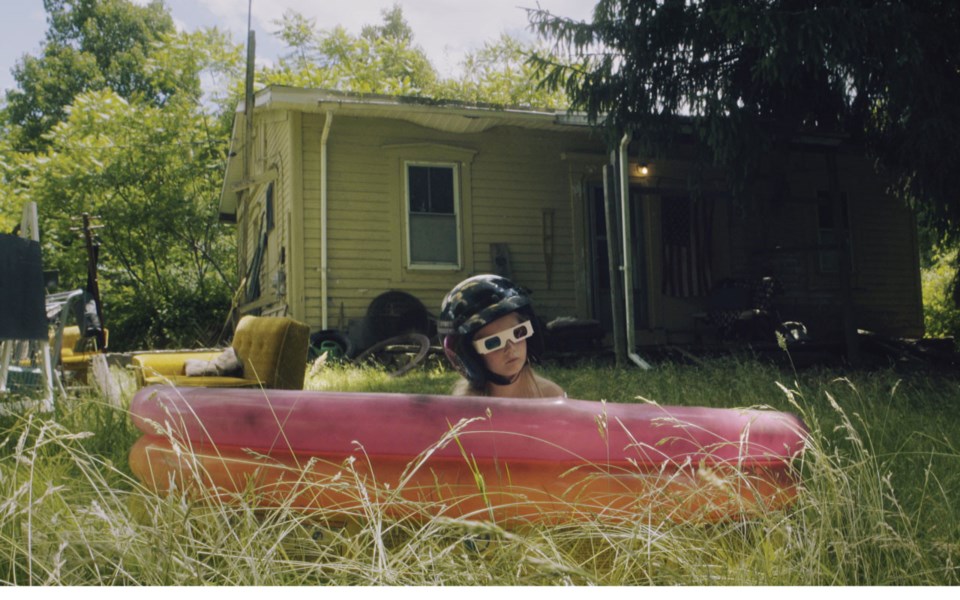Small Time centres on a young girl named Emma growing up in rural America in the midst of a bleak opioid crisis.
She bounces from her mom’s barebones forest cabin to the dirty drug den of her mother’s ex-boyfriend to her estranged grandmother’s house where her equally estranged father, riddled with PTSD from fighting the “war on terror,” also lives.
Throughout these never-ending hardships, Emma still exudes a childlike wonder navigating a life that, to the viewer, seems desperately tragic.
“She’s the reflection of who we are going to become as a society because she’s absorbing—or not—everything that’s around her,” says Niav Conty, the writer, director and director of photography for the film. “The vision [for her character] is, as a sponge, what does she absorb or what can she resist and somehow use the humanity that’s not tainted by her surroundings to become her own person. And that’s the struggle of the film. Will she succumb to all the weak behaviour around her?”
Conty originally cast then-seven-year-old Audrey Grace Marshall in the lead role of Emma back when it was just a short film and Marshall had next to no acting experience.
“After the short was well received and we had a good time and Audrey was great in it, we wanted to expand the story of this little girl,” Conty says. “It was less stressful casting because we were casting a short—not that I don’t want to cast it perfectly, but I wasn’t casting a seven-year-old with absolutely no experience to be a lead in an hour-and-45-minute feature. I would’ve gone about it differently.”
Conty wrote and shot the film over three years, which meant following Marshall from ages seven to 10. In that time, she started getting more roles in productions like the Netflix film The Last Summer and Marvel’s Jessica Jones.
“Because we turned it into a feature and left time for her to grow between each of the parts we cut between, that gave her time also to develop a career and skyrocket,” Conty adds. “And get a lot of roles in other things. This was her very first discovery on film.”
Alongside the growing drug crisis, the film delves into what might seem to Canadian viewers like cultural curiosities—the biggest of which is the omnipresence of guns.
“The place where this is shot in rural Pennsylvania, I feel very close to the nature of this place,” says Conty, who currently lives in New York City. “This is a very heavy Trump-voting area. Very religious, quite poor, a lot of addiction, and so I find [the film] is pretty near to everything that is here.”
Conty operates in nuance over the span of the film. The characters have moments of horror and humanity; Emma seems resilient, but signs of trauma might creep in; and while the viewer is pummelled with bleakness, through Emma’s innocent approach to life, it never becomes too much.
“The film was going really dark and I’m a dark person,” Conty says. “I had to find a way to not feel hopeless at the end of this film. I think it would not have served the story or the character at all. I was very conscious to bring something positive.”
While her plans for screening the film have changed thanks to the COVID-19 pandemic, it has played at—and earned accolades from—several festivals. On Dec. 19, it’s set to make its Canadian debut as part of the Whistler Film Festival, streaming until Dec. 31.
“I would’ve loved to go to Whistler, for this, but it’s not to be,” Conty says. “That said we’ve gotten really wonderful awards at most of the festivals.”
To buy tickets, visit whistlerfilmfestival.com/films.
The Sea to Sky has several places to get help with opioid addictions: The OAT clinic (Opiate Agonist Therapy) provides access to pharmacological therapies. The Overdose Outreach Team is available to meet people where they are at in their journey with addiction. For more information and to access to these programs in Whistler call 604-698-6455, Pemberton 604-698-5861, and Squamish 778-894-3200. n




